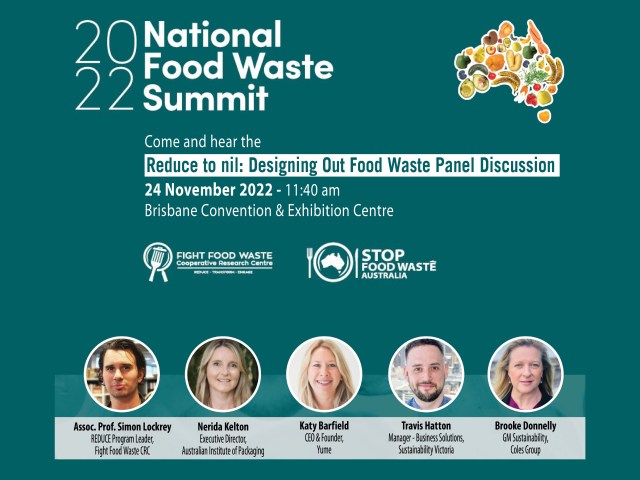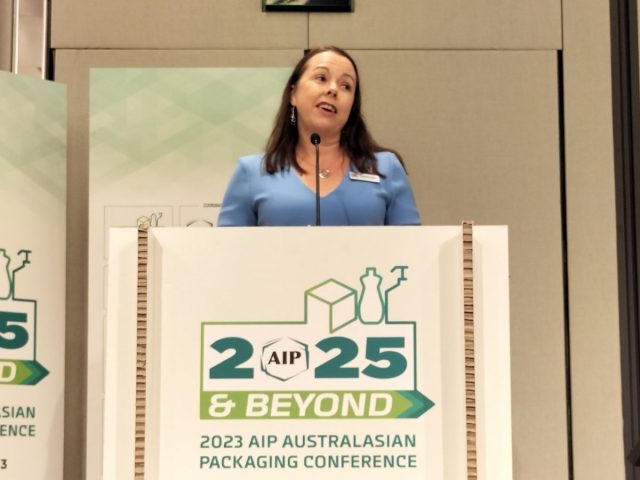
Above: AIP executive director Nerida Kelton
The Australian Institute of Packaging (AIP) is running an in person training course entitled “Save Food: Packaging Design that can Minimise Food Waste” on 6 December.
This new training course will not only help set the scene on food waste globally and across the ANZ region, but it will also help you to redesign your packaging to minimise food loss and waste.

The most innovative and intuitive Save Food Packaging uses design features that can contain and protect, preserve, extend shelf life, easily open and reseal, provide consumer convenience and portion control; all the while meeting global sustainable packaging targets.
Opportunities for packaging design to minimise food loss and waste can include better facilitation or communication around portion control, date labelling, extension of shelf life, protection, resealability and openability, serving size, food safety/freshness information, information on storage options and improved communication on packs.
The packaging should also highlight a wide range of design factors that help to prevent food waste including: mechanical protection, physical-chemical protection, resealability, easy to open, grip, dose and empty, contains the correct quantity and serving size, food safety/freshness information, expiry date and Best before date, information on storage options and improved communication on packs including open, reseal, close and dispense.
The packaging should also facilitate sorting of household waste – easy to clean, separate, recycle or reuse.
Who should attend?
Packaging Technologists & Designers have the opportunity to minimise food waste at the start by incorporating the Save Food Packaging Design guidelines into their NPD process. Embedding Save Food Packaging design features at the NPD stage ultimately reduces the product’s overall environmental impact at the start of the value chain which minimises food wasted in the household. Marketers can spotlight the SFP design features as a point of difference and send a message to the consumer that the brand is actively trying to minimise food waste from paddock to plate. Sustainability Directors can ensure that the 2030 Food Waste Targets are included in their ESG’s policies and food loss and waste across their value chain can be measured.
There is significant appetite in the food and beverage industries for the deployment of the Save Food Packaging Design principles. The Save Food Packaging design training course will provide the detailed guidelines, criteria, research and action places to arm packaging technologists, designers, innovation teams, sustainability & environmental teams, sales, business development, design agencies, consultants, procurement and marketing & communications departments with the tools to integrate the roadmap into their product-packaging design. The outcomes from this course will include more innovative and intuitive packaging that can minimise food loss and waste across the value chain all the way to the household and ultimately lower environmental
impacts.
The course will be held at:
RMIT University
Building 80, Level 4, Lecture Room 19 (80.04.19)
445 Swanston Street
Melbourne VIC 3000
Time:
09:30 am to 02:30 pm (AEDT)
Cost:
AUD $350 + GST – AIP Members & Australian Food Pact Signatories
AUD $400 + GST – Members of ABA | AFGC | AIFST |APCO | FIAL | FIGHT FOOD WASTE CRC | FOOD SA | NRA | SPE
AUD $450 + GST – Non-Members
.
Note: A Tax Invoice will be sent upon receipt of your booking. Training Course notes will be provided to each participant for future reference and use. The notes are not to be copied or distributed. No cancellations will be accepted after 29 November. Replacements will however be accepted.
*All AIP training courses are internationally recognised and approved to attain Certified Packaging Professional (CPP) points.
To register, click here.


